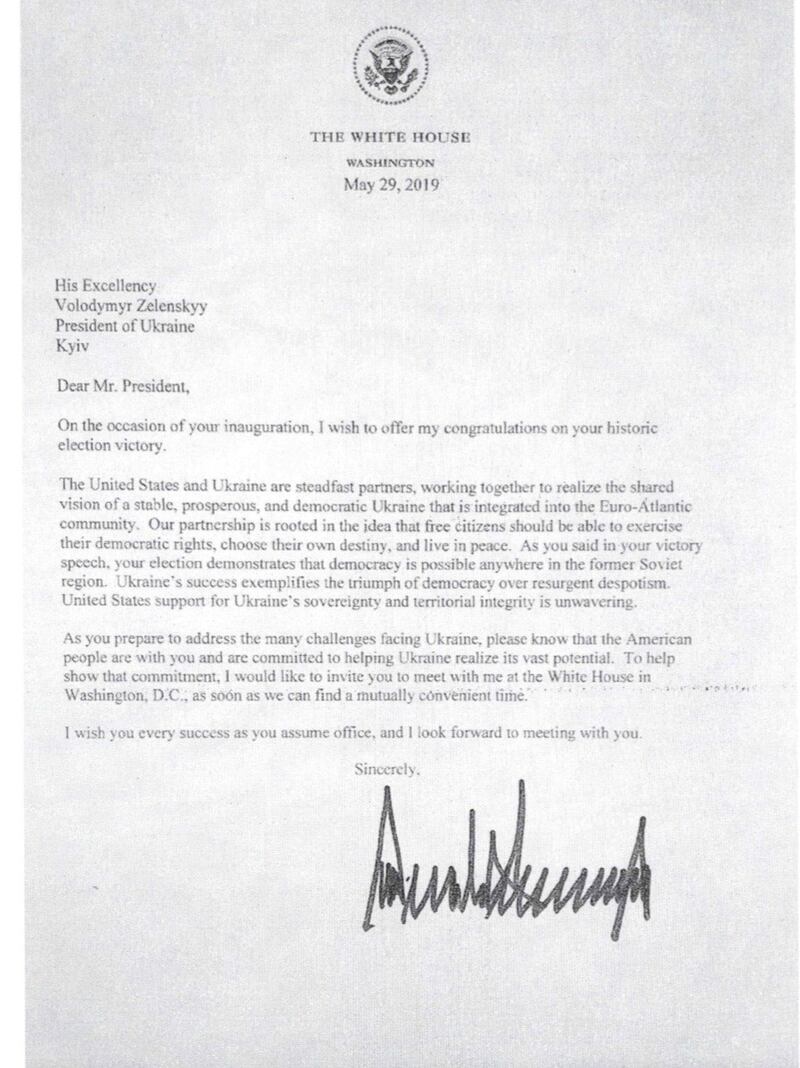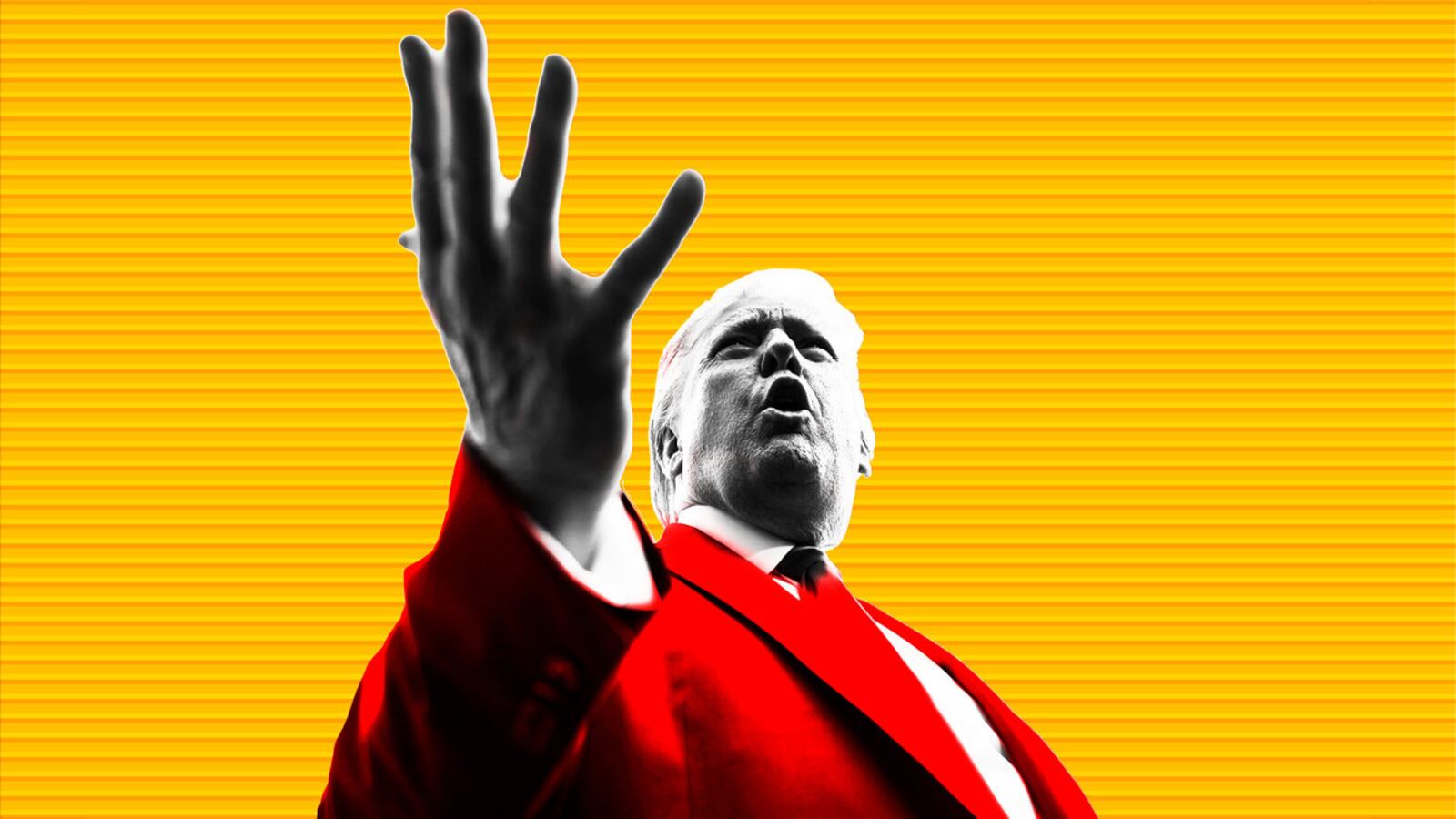President Donald Trump promised “unwavering” support to Ukraine in a May 29 letter congratulating its new president on his election victory. He also invited President Volodymyr Zelensky to the White House, saying the invitation was a sign of the United States’ “commitment” to the young democracy.
Trump’s letter, which a senior congressional aide shared with The Daily Beast, points to a sharp contrast between Trump’s official, warm communications with Zelensky and the moves he actually wanted from Kyiv. The letter, dated May 29, is published here for the first time.
“The United States and Ukraine are steadfast partners, working together to realize the shared vision of a stable, prosperous, and democratic Ukraine that is integrated into the Euro-Atlantic community,” Trump’s letter says. “Our partnership is rooted in the idea that free citizens should be able to exercise their democratic rights, choose their own destiny, and live in peace. As you said in your victory speech, your election demonstrates that democracy is possible anywhere in the former Soviet region. Ukraine’s success exemplifies the triumph of democracy over resurgent despotism. United States support for Ukraine’s sovereignty and territorial integrity is unwavering.”

But the support wavered. Over the course of the next two months, it became clear to State Department and White House officials that something was preventing a meeting between Trump and Zelensky, according to testimony from multiple administration officials who appeared before House investigators.
In his infamous press conference last month, acting White House Chief of Staff Mick Mulvaney said the letter to Zelensky was merely a “courtesy.”
“We get asked by foreign leaders all the time to either come visit their country or to have them come visit here, and we try to be courteous and say yes,” Mulvaney said. “I don’t remember a serious conversation about setting up an actual meeting. There were no dates discussed.”
In the weeks after the White House sent the letter, the president’s personal lawyer Rudy Giuliani and State Department officials including U.S. Ambassador to the European Union Gordon Sondland worked to get Ukraine to publicly commit to investigating Burisma, the gas company whose board Hunter Biden sat on. Ambassador William Taylor, America’s top diplomat in Kyiv, told Congress last month that Sondland told him “everything” depended on such an announcement, including $250 million in military aid and a White House visit.
Securing such a visit is a key foreign policy goal for the Ukrainian president. Ukraine relies on support from the U.S. to resist Russian aggression and is warring with Russian-backed separatists who have occupied territory in the eastern part of the country. Russia annexed Ukraine’s Crimean Peninsula five years ago and still controls that territory.
Trump’s private comments on Ukraine diverged wildly from the rhetoric in his letter to Zelensky. Former U.S. special representative for Ukraine negotiations Kurt Volker and Sondland both testified that Trump held a very negative view of the former Soviet republic. And The Washington Post has reported that the president has said Ukraine isn’t a “real country.” Volker and Sondland worked hard to try to arrange a White House visit for Zelensky, but without success.
In a meeting at the White House on May 23, Sondland, along with Volker and Energy Secretary Rick Perry, briefed Trump about their trip to Kyiv for Zelensky’s May 20 inauguration. Trump told Sondland and the others that he “was skeptical that Ukraine was serious about reforms and anti-corruption,” Sondland said in his testimony last month. “And he directed those of us present at the meeting to talk to Mr. Giuliani… about his concerns.”
“We were faced with a choice: abandon the goal of a White House meeting for President Zelensky… or we could do as President Trump directed and talk to Mr. Giuliani to address the president’s concerns. We chose the latter path,” Sondland said.
Just six days later, on May 29, Trump sent Zelensky the letter inviting him to the White House. The letter caught Sondland off guard, according to the transcript of his testimony. House investigators peppered the EU ambassador with questions about what transpired between his meeting at the White House and the letter being sent to Ukraine. Sondland said he “didn’t remember” if a copy of it had been presented to Trump during the May 23 meeting but that he left the White House with the distinct impression that Trump wanted very little to do with Kyiv.
Before Zelensky’s aides are reported to have learned that the Trump administration had secretly held up military aid it had promised to Kyiv, they knew something strange was going on because of the problems scheduling a White House visit. Taylor said Ukrainian officials were “confused” in a White House meeting when Sondland wanted to discuss investigations while then-National Security Adviser John Bolton focused on energy and security.
“By mid-August, because the security assistance had been held for over a month for no reason that I could discern, I was beginning to fear that the long-standing U.S. policy of strong support for Ukraine was shifting,” Taylor said in his testimony. Tim Morrison, then the top Russia official on Trump’s National Security Council, told Taylor in the days following that Trump didn’t “want to provide any assistance at all.”
And Trumpworld’s reversal on that promise is the clearest example of a quid pro quo involving U.S. policy toward Ukraine.
On Aug. 9, Sondland wrote in a text message that a National Security Council official would schedule the White House visit as soon as a Zelensky aide “confirms” that the Ukrainian president would issue a statement announcing investigations. Later that month, Volker, Giuliani, and Sondland had a phone call on which Giuliani said Zelensky’s statement needed to include an investigation into a company linked to former Vice President Joe Biden, Volker testified. Zelensky’s aide asked Volker if the U.S. Department of Justice had formally requested Ukraine’s help investigating the matter. After Volker learned DOJ hadn’t done so, he said they all agreed to hold off on such an announcement.
And thus, the Trump administration has yet to schedule a formal visit to the White House for Zelensky.







